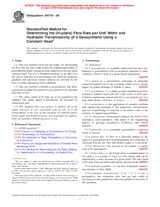Potřebujeme váš souhlas k využití jednotlivých dat, aby se vám mimo jiné mohly ukazovat informace týkající se vašich zájmů. Souhlas udělíte kliknutím na tlačítko „OK“.
ASTM D4716-08
Standard Test Method for Determining the (In-plane) Flow Rate per Unit Width and Hydraulic Transmissivity of a Geosynthetic Using a Constant Head
Automaticky přeložený název:
Standardní zkušební metoda pro stanovení ( v rovině ) Průtok na jednotku šířky a hydraulické propustnosti geosyntetickou pomocí konstantní Head
NORMA vydána dne 1.7.2008
Informace o normě:
Označení normy: ASTM D4716-08
Poznámka: NEPLATNÁ
Datum vydání normy: 1.7.2008
Kód zboží: NS-28289
Počet stran: 10
Přibližná hmotnost: 30 g (0.07 liber)
Země: Americká technická norma
Kategorie: Technické normy ASTM
Anotace textu normy ASTM D4716-08 :
Keywords:
geosynthetics, hydraulic transmissivity, in-plane flow, index test, performance test, Gradient ratio, Hydraulic conductivity/transmissivity, In-plane flow, Stress--geosynthetics, Surface analysis--soil/rock/related materials, Transmissivity and reflectivity, Compression testing--rock/related materials, Flow and flow rate--soil/rock/related materials, Geosynthetics, ICS Number Code 59.080.70 (Geotextiles)
Doplňující informace
| Significance and Use | ||||||||||
|
This test method is intended either as an index test or as a performance test used to determine and compare the flow rate per unit width of one or several candidate geosynthetics under specific conditions. This test method may be used as an index test for acceptance testing of commercial shipments of geosynthetics but caution is advised since information on between-laboratory precision of this test method is incomplete. Comparative tests as directed in 5.2.1 may be advisable. In case of a dispute arising from differences in reported test results when using this test method for acceptance testing of commercial shipments, the purchaser and the supplier should first confirm that the tests were conducted using comparable test parameters including specimen conditioning, normal stress, seating period, hydraulic gradient, test water temperature, etc., then conduct comparative tests to determine if there is a statistical bias between their laboratories. Competent statistical assistance is recommended for the investigation of bias. As a minimum, the two parties should take a group of test specimens that are as homogenous as possible and that are formed from a lot of the material of the type in question. The test specimens should then be randomly assigned in equal numbers to each laboratory for testing. The average results from the two laboratories should be compared using the Student's t-test for unpaired data and an acceptable probability level chosen by the two parties before the testing is begun. If bias is found, either its cause must be found and corrected or the purchaser and supplier must agree to interpret future test results in light of the known bias. |
||||||||||
| 1. Scope | ||||||||||
|
1.1 This test method covers the procedure for determining the flow rate per unit width within the manufactured plane of geosynthetics under varying normal compressive stresses and a constant head. The test is intended primarily as an index test but can be used also as a performance test when the hydraulic gradients and specimen contact surfaces are selected by the user to model anticipated field conditions. 1.2 This test method is limited to geosynthetics that allow continuous in-plane flow paths to occur parallel to the intended direction of flow. 1.3 The values stated in SI units are to be regarded as the standard. The values stated in parentheses are provided for information only. 1.4 This standard does not purport to address all of the safety concerns, if any, associated with its use. It is the responsibility of the user of this standard to establish appropriate safety and health practices and determine the applicability of regulatory limitations prior to use. |
||||||||||
| 2. Referenced Documents | ||||||||||
|
Doporučujeme:
Aktualizace technických norem
Chcete mít jistotu, že používáte pouze platné technické normy?
Nabízíme Vám řešení, které Vám zajistí měsíční přehled o aktuálnosti norem, které používáte.
Chcete vědět více informací? Podívejte se na tuto stránku.




 Cookies
Cookies
